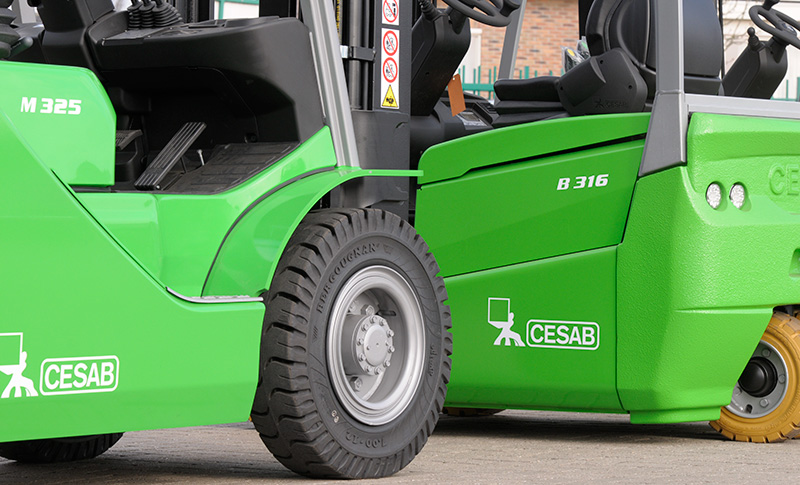The most often used forklift truck tyres are pneumatic or solid, but these aren’t the only types available. Forklift trucks can be fitted with specialised tyres to optimise a fleet’s efficiency. Each kind of tyre delivers a significant variety in the compound, tread, and ply rating. Companies equipping their forklifts must consider each type of tyre and whether it is suited to their operation.
Not all tyres can meet every requirement. To maximise productivity, companies must ensure that their equipment forklifts can operate at 100 per cent regardless of any changes to the environment. This issue is particularly pertinent in outdoor operations where potential weather hazards are often outside a company’s control.
Certain warehouses may require specific tyre types based on their location or due to the kind of materials that forklifts must move. Tyre size should only be decided after the required load each wheel must bear is calculated. As a general rule, the best practice is to select a tyre that can carry the load using the lowest inflation pressure possible. Read on as we explore the different types of tyres available for forklifts and their uses, along with how to maintain them in good working order.
Cushion Tyres
These tyres have a small turning radius making them ideal for work areas where space comes at a premium. They are only suited to warehouses with level concrete flooring and smooth pavements.
Pneumatic
These popular tyres are similar to truck tyres. Air-filled, pneumatic tyres have thick, and deep treads and are fabricated from robust wear-resistant rubber. These tyres can extend a forklift’s running life by providing a cushioning effect between the vehicle and the ground it operates on.
Off-Road and winter tyres
These tyres are often fitted on side loaders at outdoor operations where the terrain is rugged or on sites where tarmac or paving is not a practical option. Off-road tyres are designed to be puncture resistant and provide enhanced grip.
Non-slip winter tyres are also available with similar properties providing superior traction in icy conditions.
Fibreglass
This tyre type is exceptionally resistant to heat making it an ideal option in operating environments with high temperatures. In such conditions, fibreglass tyres can outlast standard tyres.
Static-Resistant
These tyres are designed specifically to stop a static discharge. As a result, they are often used on forklifts where materials being handled are explosive or highly combustible.
Care and maintenance for forklift tyres
Many forklift tyres have a dedicated wear line, if yours are worn passed this point it’s time to replace them. Additionally, look out for cracking, skid marks, balding and flat spots as these can also be indicative that an update is necessary.
Operators must ensure that the air pressure in their forklift tyres is regularly checked to make sure that it remains at the right level. Multiple factors can decrease or increase tyre pressure. For instance, heat can build up with extended use resulting in an increase in tyre pressure. Users must ensure all valves and caps are covered so they don’t lower the air pressure via bleeding, as this can also increase heat build-up.
Drivers should refrain from any sudden starting or braking movements, cornering with excessive speed and locking wheels for tight turns. Such high impact moves can wear out tyres before their time.
Always remember that tyres must be stored in an area that is dark, cool and free of oil. Rubber decays over time, so tyres should never be stored for extended time periods. Proper tyre maintenance can not only keep your forklift tyres in good shape but reduce stress on the vehicle’s transmission and its driver.
Find out more about how we can help you with your forklift tyres and your fleet by contacting our friendly team today.

 01282 842 678
01282 842 678